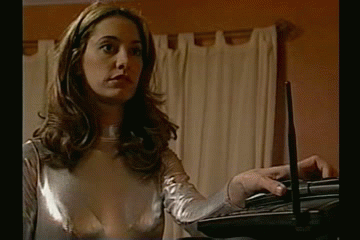Blank stare: Difference between revisions
The "In fiction" page seemed to be largely unnecessary cruft. The images should be just fine for that. |
No edit summary |
||
| Line 4: | Line 4: | ||
A '''blank stare''' is a facial expression that conveys a lack of emotion and apparent thought. The character will stare off into the distance, unblinking or blinking only occasionally, and show no emotional range or reaction. Often times, this is utilized in several contexts, such as to highlight a character who is confused or dazed, experiencing some form of psychological trauma or shock, as a symptom of hypnosis or drug use or to show a character lost in their thoughts. | A '''blank stare''' is a facial expression that conveys a lack of emotion and apparent thought. The character will stare off into the distance, unblinking or blinking only occasionally, and show no emotional range or reaction. Often times, this is utilized in several contexts, such as to highlight a character who is confused or dazed, experiencing some form of psychological trauma or shock, as a symptom of hypnosis or drug use or to show a character lost in their thoughts. | ||
In gynoid related fiction and media, blank stares are utilized to convey a lack of emotion and independent thought that is often associated with robots or androids. This is especially common in androids or robots that are depicted or foreshadowed as threatening, as a further conveyance of their lack of empathy, but on occasion is used merely to display an android's nature without having to display their artificiality by more invasive or time-consuming means, such as opening an [[Access panel]]. It is also frequently used to denote when an android or robotic character is offline or to indicate to the audience that they have been shut down. | In gynoid related fiction and media, blank stares are utilized to convey a lack of emotion and independent thought that is often associated with robots or androids. This is especially common in androids or robots that are depicted or foreshadowed as threatening, as a further conveyance of their lack of empathy, but on occasion is used merely to display an android's nature without having to display their artificiality by more invasive or time-consuming means, such as opening an [[Access panel]]. It is also frequently used to denote when an android or robotic character is offline or to indicate to the audience that they have been shut down, or that an android with a normally wide range of emotions or expressions is malfunctioning or has their ability to process independent thought shut down or otherwise disabled. | ||
Because this effect is relatively simple in live action productions, relying only on an actor or actress' ability to maintain an expressionless stare, it's frequently used in productions that have a limited effects budget. In other productions, this is still a convenient method of displaying a character's robotic nature without having to take time showing a character's internal workings. | Because this effect is relatively simple in live action productions, relying only on an actor or actress' ability to maintain an expressionless stare, it's frequently used in productions that have a limited effects budget. In other productions, this is still a convenient method of displaying a character's robotic nature without having to take time showing a character's internal workings. | ||
Revision as of 05:37, 21 September 2019
 From the film Upgrade: The robot Kim attempts to reconnect to receive programming updates From the film Upgrade: The robot Kim attempts to reconnect to receive programming updates
|
A blank stare is a facial expression that conveys a lack of emotion and apparent thought. The character will stare off into the distance, unblinking or blinking only occasionally, and show no emotional range or reaction. Often times, this is utilized in several contexts, such as to highlight a character who is confused or dazed, experiencing some form of psychological trauma or shock, as a symptom of hypnosis or drug use or to show a character lost in their thoughts.
In gynoid related fiction and media, blank stares are utilized to convey a lack of emotion and independent thought that is often associated with robots or androids. This is especially common in androids or robots that are depicted or foreshadowed as threatening, as a further conveyance of their lack of empathy, but on occasion is used merely to display an android's nature without having to display their artificiality by more invasive or time-consuming means, such as opening an Access panel. It is also frequently used to denote when an android or robotic character is offline or to indicate to the audience that they have been shut down, or that an android with a normally wide range of emotions or expressions is malfunctioning or has their ability to process independent thought shut down or otherwise disabled.
Because this effect is relatively simple in live action productions, relying only on an actor or actress' ability to maintain an expressionless stare, it's frequently used in productions that have a limited effects budget. In other productions, this is still a convenient method of displaying a character's robotic nature without having to take time showing a character's internal workings.
Examples
-
Animated
-
Animated
-
Animated
-
Animated
-
Animated
-
Animated










